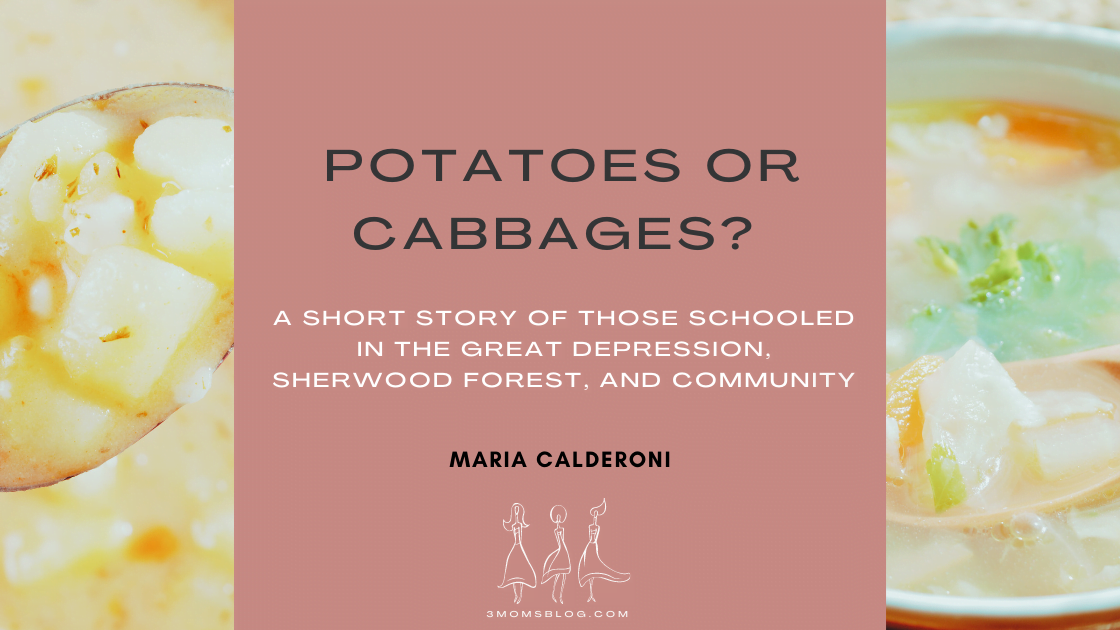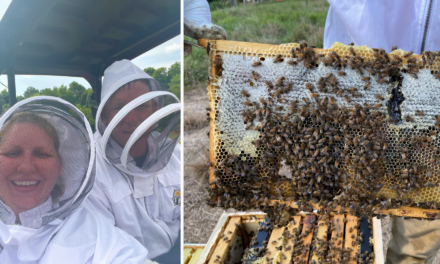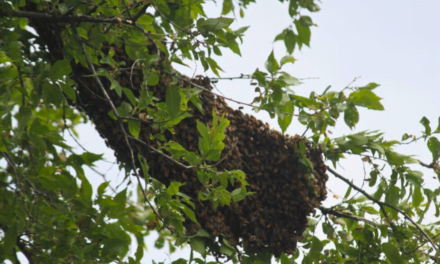For children growing up in rural Canada just after World War II, raised by parents who had barely survived the Great Depression and Dirty 30’s, it was a time of resourcefulness. I have been gifted with the legacy of a thrifty family of survivors. Both my mother and grandparents had an amazing knack for creating delicious meals out of almost nothing.
With barely enough to feed their own four children, my grandparents were also known for their generosity–feeding hobos and anyone within their reach that needed a hearty meal, even if it was only cabbage soup or scalloped potatoes.
This well-told story from my mother’s childhood is a beautiful snapshot of how this amazing woman became who she was and the solid roots of a generous family of survivors. (Read to the end for my grandmother’s scalloped potato recipe!)

The distant sound of crunching gravel could be heard as the light footfalls of running children were soon drowned out by their merry banter. “Last one to Sherwood Forest has to be the Sheriff of Nottingham!” hollered the tall boy over his shoulder, dashing far ahead of the others.
At the back of the pack was a thin girl holding the hand of a much smaller, though less emaciated, younger sister. They raced along kicking up dust, “Hurry, Dena, you don’t want to be the rotten Sheriff do you?” urged the older sister.
a proud legacy
The favorite pastime for neighborhood children in these days of scarcity and recovery was playing Sherwood Forest. Every chance they got, it was off to their magical glen. 10-year-old Alma was sickly, but firmly determined to at least keep up. “Follow me,” she insisted, tugging Dena through a barbed wire fence and into the overgrown field.
Shortcut or not, both girls knew the danger of rattlesnakes. “Stomp your feed hard,” the older girl instructed, “it lets the critters know we are here.”
They ran near the dilapidated fence and then headed cross-country, trying to cut the others off and get to the hideout first! Panting and dragging 4-year-old Dena, Alma doggedly raced, eyeing the others charging down the road. “We’re gonna make it,” she encouraged.
“I can’t,” whined the little girl, “stop dragging me,” and she stamped her tired foot.
The youngest of four girls, Dena did not like being left out, and Alma was her closest sister, companion–and really, her second mother. Though both of their parents were handicapped, they refused to accept any assistance. Working hard to eke out a living, they had been schooled during the Great Depression and started their own family during the Dirty 30s when Canada was still fighting to recover. Now, living in mining and farm country in southern British Columbia, they did not go hungry–well, not very hungry. It was 1952. The war had ended seven years prior, and life had found a gentle, humble rhythm.
Huffing and puffing, the two girls raced for the secret lair. As they burst through the broken fence and into the hollowed-out shelter under the giant old willow tree, they saw that they were last to arrive.
Sherwood Forest
Alma groaned and gave the little girl’s arm a sharp yank. Immediately regretful, she leaned over, “It’s OK. I will be the sheriff, and you can be my trusty sidekick.“
Will Scarlett was her preferred character or Robin Hood, but they changed roles each time, giving everyone a chance to depict their favorites. A voracious reader, Alma had a very worn copy of the book and was a master at weaving the start of a scene for them to bring to life on any given day. “It’s right after Robin comes upon Friar Tuck and tricks him into carrying him across the river.”
As ‘Robin’ came suddenly upon the singing friar, the ‘Sheriff’ still dragging his sidekick ran to hide alongside the trail. The ‘Merrymen’ scattered and the surprised ‘Friar Tuck’ was caught off guard singing loudly and possibly inebriated, resting against a tree by the small creek.
“Say, fine fellow,” cajoled Robin, jumping in front of Friar Tuck and skillfully disarming him. “I need you to transport me on your back across this mighty river.”
Sputtering and reaching for his sword, Friar Tuck ambled awkwardly to his feet. “I will do no such thing!” He shouted, grabbing for the stick in Robin’s hand and stumbling forward landing facedown on the creek bank.
The Sheriff and Merrymen found themselves giggling uproariously as Robin extended his hand to help Friar Tuck up. After arguing for several minutes, the Friar acknowledged he’d been bested and Robin, the tall lad, leaped on his back nearly toppling them both into the muddy creek. Halfway across Robin leaned down to coach Friar Tuck, “This is where you dump me and grab your sword back,” he whispered.
At which Friar Tuck curled forward and both children tumbled into the water head first.
‘til green shadows
Surfacing quickly and dripping muddy water, Robin howled angrily, “Now look what you’ve done, you drunken fool!”
And Friar Tuck, now in possession of both swords climbed on Robin’s back and ordered him back the way they had just come. After a few more exchanges of weaponry and several dunkings, Alma yelled, “Now off with you. Take Friar Tuck back to your den so the Sheriff can waylay you all!”
And so their fantasy continued through the afternoon until the sun began to descend behind the mountain, casting shadows of green through Sherwood Forest.
Trudging home at a more reasonable pace, the children relived the day’s events. Tuckered out, Dena tried to keep up without complaint, but tired of repeatedly falling behind, Alma bent over to allow the girl to ride piggyback. After a long hard day of play, the return trip felt wearying. They called goodbye as friends dropped home along the way and finally, it was just the two of them for the final two blocks.
One foot after the other Alma willed her legs to keep moving. Arriving home, she crept around back. Entering the door into the kitchen, legs aching, she crouched to let her sister climb down. Half-awake, half-asleep, Dena crumpled to the floor.
“Get up, sleepy head, we need to help Mom with dinner,” Alma stretched back up slowly, carefully, rubbing her legs. Surviving polio had left her legs weaker and slower to recover from exertion.
Dena lay where she had landed, and Alma quickly washed up and looked to see what needed to be done. Her mother was a plump and pleasant woman, legally blind, though she could see well enough to run her household and care for her four girls it seemed.
which kind of night?
Alma looked in the pot on the stove to see if it was a potato night or a cabbage night. Things had gotten better since the war but not a lot. They had a garden which supplied them with cabbages and potatoes as well as plenty of salad vegetables. Sometimes their mother would let them choose if they preferred cabbage with potatoes or potatoes with their cabbage.
It looked like mostly potatoes tonight with a bit of cabbage and some carrots too. Yum! This was Alma’s preference.
They often traded with neighbors for fresh milk, and the Doukhobors occasionally gave them borscht. Borscht and fresh bread was Alma’s favorite meal, and if she could have enjoyed that rich soup everyday she might not have looked half-starved.
“You girls get washed up and set the table,” exclaimed Cecelia, “Dena! Get up off the floor child, it’s dinner time.”
Their mother’s parents had argued over naming her. One insisted on Lilly and the other Cecelia. They never could agree and so their compromise was that she was named Cecelia and was always called Lilly. Alma thought it fascinating that Cecelia meant ‘dim sighted.’ Even though she was never called Cecelia, she had definitely grown into the moniker’s definition.
Eight and nine years older respectively, her older sisters were rarely home it seemed. So it was the four of them and whomever their father found in need and brought home. Elmore was the youngest of six. His mother disappeared and was presumed dead when he was only eight years old.
After the sale of the family dairy, Elmore moved his family from Nelson, where he had lived his whole life, to Grandforks in pursuit of a livelihood to feed his young family.

gifts of compassion and music
Like his wife, he too had a vision impairment having lost his right eye in a mysterious accident as a boy. He never spoke of it and neither did anyone else.
Elmore worked as a yardman for the railroad. No one was sure if he just didn’t see the hobos embarking and arriving surreptitiously on the trains, or if he purposely turned a blind eye being a man with a compassionate heart. It was these weary travelers whom he often brought home to share a meal with his family. Sometimes they were quiet and simply thankful, more often they were full of stories and sometimes even music.
Lilly was also a gifted musician, and evenings in the Calbick home were often filled with joyful melodies wafting through the windows into the crisp night air. There was no instrument that their mother couldn’t play. She more than made up for her lack of sight with her sharp ears and ability to pick out a tune on anything. Her voice was beautiful as well, untrained, but nonetheless a great joy to her family and in summer when the windows were open, to her neighbors as well.
“No guests tonight?” Lilly commented as Elmore joined them, having washed outside on his way in. He was usually covered in soot and tried his best to leave most of it out of their tiny home.
Dena scooted closer to her dad on the bench, “I am the Sheriff of Nottingham’s helper,” she told him conspiratorily.
“What?” he looked puzzled then turning to his wife, he reminded her, “Tomorrow is the potluck after church.”
An usher in the Anglican church he took his responsibilities very seriously.
“I already made scalloped potatoes,” she smiled knowing he would be pleased, “The girls dug potatoes before they ran off to play in the woods this afternoon.”

simple generosity
She leaned back from her seat and without getting up, opened the oven door. Warmth spread into the cozy room as she gestured to their largest baking dish filled to the brim. He seemed satisfied. Generosity was something he valued highly and even if they had to scrimp or go without, he would never want to be thought stingy, especially with food–especially at church.
Up at the crack of dawn, Alma was dressed and had chosen a dress for Dena. She took it upon herself to make sure her younger sister was well-clothed. As the youngest and most outgoing she was usually the center of attention and so reflected upon the rest of the family. Grabbing her Bible, she was about to slip out to the back porch to read when the sleepy household was jarred into wakefulness by the shrill clamoring of one of the only telephones in the entire town.
Her father leaped out of bed to answer, acknowledging the requests abruptly. He had a phone for just this reason. His position at the train yard involved keeping the lines safe and correctly switched. He needed to be available at the drop of a hat. “I will meet you at church,” he called to Lilly, throwing on his work clothes. Should I bring a change of clothes?” she asked. “No. I’ll stop back here.” And the door closed. He was quick. He took all his responsibilities very seriously. That was who he was.
Now everyone was up, even the older sisters who had been out late with friends the night before. Alma put her Bible aside and started oatmeal for breakfast. She served Dena’s and her own and left the rest to fend for themselves. Heads close together, the two whispered back and forth remembrances of the previous day’s play.
a funny thing on the way to church
Dena giggled thinking about the creek dunkings. Alma shushed her, not wanting the others to make fun of them. “Good morning, Mom,” she said, jumping up to serve a bowl of oats for her mother after all.
They were a loving family, though not overly demonstrative. Lilly joined them at the table and reminded them of their memory verses for Sunday School. Dena, a sharp child, knew her verse right off. Alma recited her verse quietly and without show. “That’s my girls,” their mother praised. “Now help me wash up so we won’t be late.”
While Dena wiped off the table, Alma quickly washed dishes. They left the oatmeal warming on the stove for the big girls and set off for church with Dena holding her big sister’s hand and Lilly carrying the big pan of scalloped potatoes. It was neatly wrapped in a pretty dish towel; it was apparent that their mother was pleased with how it had turned out. They couldn’t drive to church because their dad had taken the car to the station, and their mother’s lack of eyesight prevented her from ever driving. The walk was not terribly far, and it was a pleasant morning. Many other families were walking as well. As they drew near the church, they fell in step with friends and exchanged pleasantries.
“Hello, Lilly. Girls,” smiled an older woman carrying a baking dish as well. “And what dish did you bring?” she asked.
“Scalloped potatoes,” Lilly lifted the corner of the dish towel to show the delicious-looking casserole.
Laughing and smiling the woman lifted the cover on her dish as well, showing Lilly that she too had brought scalloped potatoes. They both laughed. “I’ll try yours and you can try mine,” smiled Lilly.
great minds
The girls each found friends to walk to class with and waved to their mother who carried the dish to the church kitchen. Alma loved church. There was just something about it that gave her peace. And honestly, she always enjoyed potlucks too. “What did your family bring for potluck?” She whispered to the girl sitting next to her in Sunday school.
“Scalloped potatoes,” was the quiet reply.
Alma stifled a giggle. “So did we. And so did Mrs. Posnikoff.”
They exchanged amused looks and then straightened up to pay attention. After Sunday school there was time to visit, and the kids rushed outside to play in the churchyard. Tag, Blindman’s Bluff, and other games made everyone forget about the potluck. Soon the bell rang and it was time to join their families for church. Alma saw the family car parked near the church and realized her dad had made it on time. As she entered the sanctuary, she saw that her dad was at his post ushering people to their seats. She smiled at him and joined her mother and all three sisters in a pew near the front on the right-hand side. Their church did not have assigned seats or anything, but most families sat in the same place week after week year after year; they might as well have put their names on the rows.
The service went quickly. Readings from the Bible and Book of Common Prayer. The Eucharist. Prayer and a sermon. Before she knew it, they were filing out reverently and headed for the fellowship hall. Alma went with her mom to see if she could help set things up for the potluck. Most of the work was done by the time they entered the hall and the ladies were abuzz with some sort of secret.
some secret
“Are you sure?”
“Did you ask Martha too?”
“Yes, I think it’s almost everyone.”
“What are we going to do?”
“What are the chances?”
“How could this happen?”
Alma was curious. “Mom, what’s wrong? Why does everyone seem so concerned? What’s going on?”
Her mother didn’t seem to know either. The tables were ready, the covered dishes set out so prettily and the priest stepped to the front of the room.
Clearing his throat loudly to get everyone’s attention he began hesitantly, “Welcome. I would like to say a blessing over this um uh most uh unusual potluck.” Several ladies leaned close to each other and were whispering like school girls. Alma looked at her mom perplexed. “Yes, um let us pray.” he continued. “Heavenly Father, we give you thanks. Thanks for each family here. Thanks for providing us with food and health and friendship, and um Lord, thank you for um the potatoes. Amen.” He paused for a moment then went on, “It seems that everyone has brought their own family version of scalloped potatoes. So you will all receive the honor of trying each other’s scalloped potato recipes.”
The room was completely silent. And then suddenly, as one, everyone burst into laughter. The families good-naturedly lined up and made a point of trying as many different versions of the economical and delicious dish as they could.
scalloped potato recipe
| 5-6 potatoes sliced thinly | milk to ¾ fill pan |
| 1 onion sliced thinly | ⅛ cup flour |
| salt & pepper to taste | ¼ cup butter |

- Line a 9×13 baking dish with one layer of sliced potatoes.
- Cover with 1 scant layer of sliced onions.
- Sprinkle with a small amount of flour, salt and pepper.
- Put small pats of butter over the flour.
- Repeat layers until the pan is full or you are out of potatoes and onions.
- Sprinkle any remaining flour lightly over the top.
- Put the remaining pats of butter all over the top.
- Sprinkle with salt and pepper.
- Pour milk over the top of the dish wetting the flour and butter.
- Milk should almost cover potatoes.
- Bake at 350 degrees for 1 hour.

Maria
don’t miss a thing!
sign up for weekly tips and freebies





